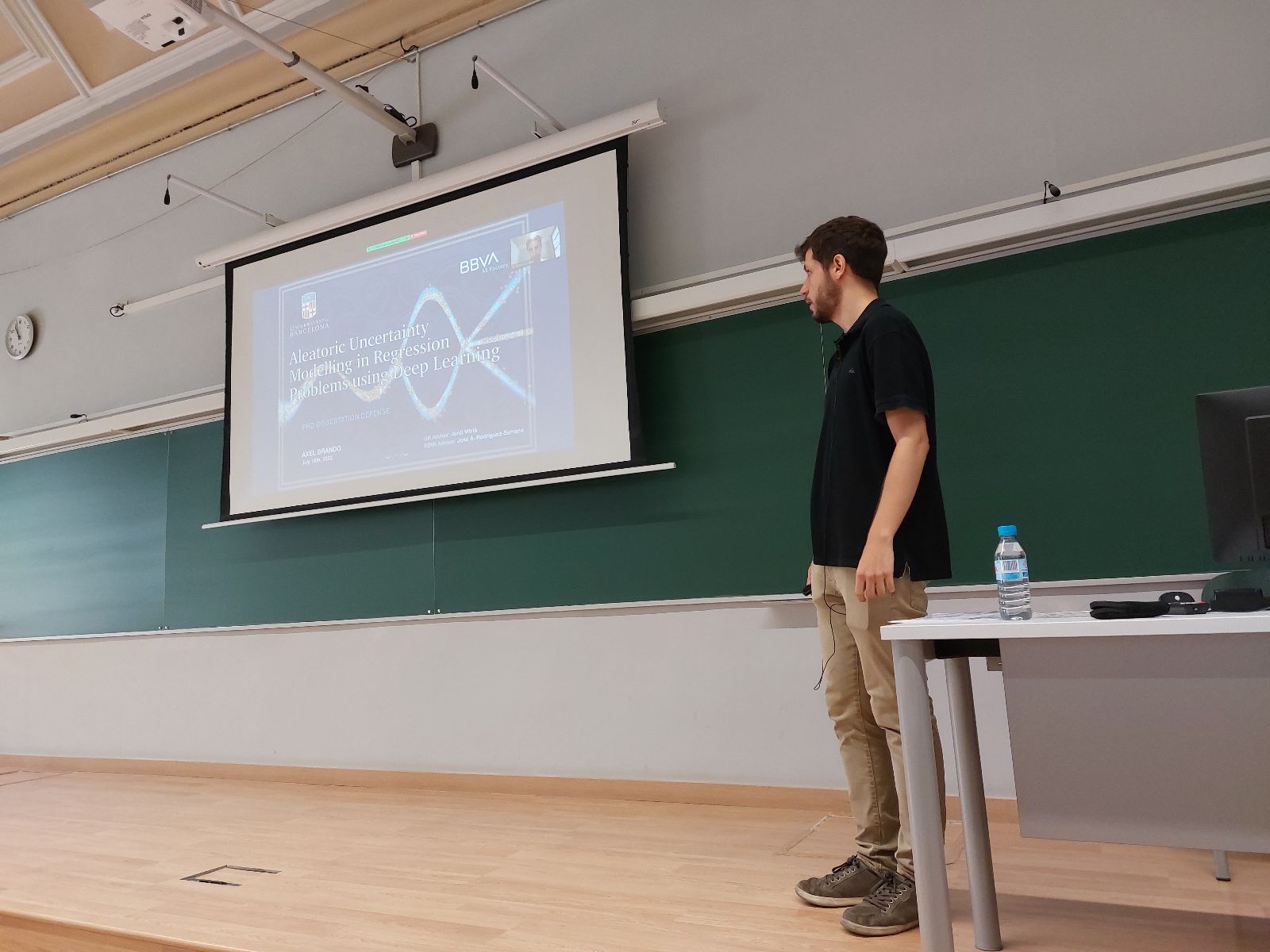Our former colleague Axel Brando defended his thesis entitled “Aleatoric Uncertainty Modelling in Regression Problems using Deep Learning“ in Barcelona on Monday 18 July. This work, directed and tutored by Jordi Vitrià, full professor at the University of Barcelona, and José A. Rodríguez Serrano, Senior Expert Data Scientist at BBVA AI Factory, identifies the different sources of uncertainty present in any predictive system and proposes new deep learning tecniques to model -and therefore take into account- a critical type of uncertainty called aleatoric uncertainty. In addition, the present research addressed the problem of modelling uncertainty in systems already in use that do not have to be based on Artificial Intelligence (referred to as black box models).

This approach is essential to develop more robust and reliable predictive models that allow us to make better decisions, especially in high-risk scenarios. The research carried out by Axel at BBVA AI Factory started from a real business need of the bank, which ultimately resulted in the development of new data products made available to our customers. Thus, the results of this research work can currently be seen in the account balance forecast for the next month that the BBVA app shows us, as well as alerts about upcoming changes to our account, which help us to have a clearer picture of our financial health and anticipate potential setbacks.
All information related to this research is available on this website. Finally, we would like to reflect in this article the original summary of the research work carried out by Axel Brando:
Uncertainty is always around us. Every decision we take has an associated likelihood of success and decisions made by autonomous systems are not an exception. Despite the great advances in the field of artificial intelligence, the inability of these systems to identify a higher risk scenario a priori could prevent their inclusion as part of solutions to many real problems. This is why it is essential that these systems learn how to model and deal with uncertainty. Starting from a probabilistic approach, this thesis proposes to formalize the different types of uncertainty and, in particular, focus its research on one type of uncertainty, the aleatoric uncertainty, since it is detected as the main uncertainty for the financial real-world problem that motivates this doctorate. Based on such research, the thesis proposes new models to improve the state of the art in modeling such uncertainty as well as introduces a new real problem that appears when there is a fixed predictive system that does not model uncertainty and we want to model uncertainty a posteriori, without changing the original model. This problem will be denoted as the modeling of the uncertainty of a black box system and will motivate the proposal of new models specialized in maintaining the predictive advantages, such as Quantile Regression (QR), but for the black box problem. Subsequently, the QR research will motivate the proposal of new models to solve a QR literature problem known as the crossing quantile phenomena, which appears when different quantiles are predicted simultaneously and they do not preserve their correct order with respect to their quantile value. Finally, all of the above research will be summarized in visualization and evaluation methods for the predicted uncertainty to produce uncertainty-tailored methods.
⎋ Access the full PhD Dissertation
Published content related to this research:
⎋ “Detecting balance anomalies with uncertainty models”
⎋ (Spanish) “Las redes neuronales tienen derecho a no poner la mano en el fuego”, El País Retina
⎋ “How to teach artificial intelligence and say, ‘I’m not sure'”
⎋ Modelling heterogeneous distributions with an Uncountable Mixture of Asymmetric Laplacians (video)
⎋ “Bayesian Deep Learning meets Google Cloud for a better forecasting engine at BBVA”
⎋ “BBVA and Google Cloud develop an AI model to improve the prediction of expenses and revenues”
⎋ “Improving Predictions in Deep Learning by Modelling Uncertainty”